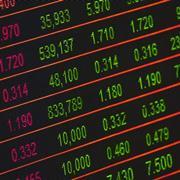Amundi: ESG Investing Has Influenced Equity Performance

The ESG investing wave that is sweeping through Europe has started to affect supply and demand, with a subsequent effect on stock prices since 2014, according to research from Amundi.
An Amundi research team studied the performance of 1,700 companies from different regions in the period from January 2010 to December 2017.
It said it focused on more recent years to benefit from higher confidence in the ESG data used. Before the 2008 financial crisis, ESG investing had been “more of an anecdotal and explanatory investment idea”.
The asset manager found that the impact of screening companies on the basis of environmental, social and corporate governance (ESG) criteria had little impact on portfolio risk during the study period, but was crucial in terms of portfolio returns.
Amundi claimed 2014 had marked a turning point for how the stock market integrated “extra-financial” metrics. In the first half of that period, ESG investing tended to penalise both passive and active investors, but from 2014 to 2017 ESG investing was a source of outperformance in Europe and North America.
In the euro-zone, for example, buying the 20% best-ranked stocks on an ESG basis and selling the 20% worst-ranked would have generated an annualised excess return of 6.6% during that period. That was in contrast to losses of 1.2% between 2010 and 2013.
“ESG investing remains an alpha strategy in North America, whereas it has become a beta strategy in the euro-zone”
The most important trend reversal occurred in relation to the corporate governance component, according to Amundi. The social component improved significantly from 2015 and had now been positively priced by the stock market.
Overall, Amundi said, the study revealed that ESG did not affect all stocks, but tended to influence best- and worst-in-class assets.
“The causal mechanism lies on demand and supply dynamics, as well as the virtuous circle created by the intrinsic added value of ESG screening,” it said.
“Impact on performance is driven by increasing investor demand for ESG approaches, which generates flows into best-in-class stocks, which in turn boosts stock prices and performance.”
‘No free lunch’
Amundi found exactly the same results for passive management as for active management – but warned that “there is no free lunch”.
“Being an ESG investor requires taking on a tracking error risk,” the company said.
Amundi found that, in the case of the MSCI World index, improving the ESG score by 0.5 implied accepting a tracking error of 32bps on average.
Developing ESG-based strategic asset allocation policy and ESG-based equity indices was “the only way to avoid being constrained by the traditional cap-weighted benchmarking framework”.
The asset manager also studied the effect of applying ESG investing within a factor investing framework, saying the case for it was “more puzzling”.
“Backward looking, ESG seems not to be a new risk factor in North America, whereas ESG could improve the diversification of multi-factor portfolios in the euro-zone,” it said.
In other words, it added in a footnote, “ESG investing remains an alpha strategy in North America, whereas it has become a beta strategy in the euro-zone”.
“Forward looking, ESG appears to be a very serious candidate to join the very exclusive club of risk factors that explain the cross-section of stock returns,” Amundi said.
Thierry Roncalli, head of quantitative research, added: “This new scientific research confirms the time-varying dynamics of ESG performance.
“Since stock prices reflect supply and demand balance, our research shows that ESG screening has influenced stock market performance. It is apparent that ‘extra-financial’ ESG risks have become financial risks and that asset pricing momentum is in favour of ESG investors.”
The research paper can be found here.
EU Negotiators Agree On Sustainability Taxonomy, Approval Still Needed
Efama calls for action on corporate reporting given investor disclosure requirements Read more
Large Dutch Metal Schemes Keep Premium, Accrual Unchanged In 2020
PMT and PME announce significant contribution rise for 2021 Read more
AP1 Hit By New Rules Breach As Head Of Equities Agrees To Quit
Swedish national pension fund says Olof Jonasson bought into firms AP1 later invested in Read more
IPE Conference: Pension Funds Find Changing Public Opinion Is Part Of A PE Investors Role
“Locusts” perception of private equity poses challenges for would-be investors Read more
IPE Conference: Long-term Horizon Hailed As Key To Improved Investment Approach
‘The biggest risk is that you will not achieve any returns in the coming decades,’ says Jaap van Dam, 300 Club Read more
UK Roundup: TPR Debt Recovery Rate Low, £40m Missed
KPMG sells UK pensions practice Read more

